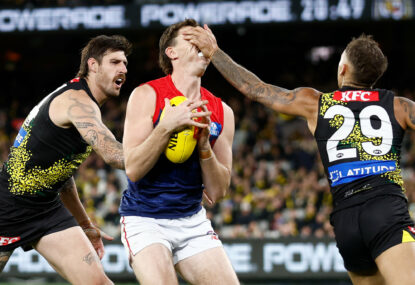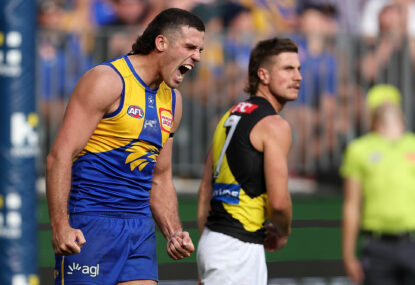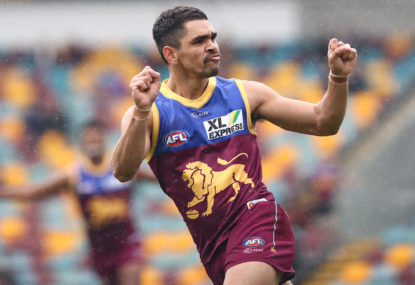We’ve played just four rounds of football in season 2014, yet there has been highlights aplenty.
Hawthorn’s continued dominance, Geelong doing what they’ve done for the best part of the last decade, Port Adelaide improving on their incredible 2013 campaign, and Greater Western Sydney’s young guns coming of age – they are just a few of the memorable moments of what’s been an engrossing, thoroughly entertaining, opening month of footy.
The most important story, though, in my opinion, is that of Mitch Clark.
Earlier this month, the Melbourne Football Club announced that their gun forward had informed them of his decision to retire due to an ongoing battle with a mental illness.
The announcement had an impact on me, and I’ll explain why, and I followed the story with particular interest.
You see, I have something in common with the tall Western Australian. I too am living with a metal health issue – clinical depression, to be specific. I use the word ‘living’, rather than ‘suffering’, because I’m able to accept the fact that the illness is part of me. It’s just that – an illness – not a weakness.
I was diagnosed with clinical depression in 2011, but I’m certain the ‘black dog’ has been an unwanted companion of mine for much of my 34 years.
During the past three years, there’s been times where I’ve found it hard to get out of bed, brush my teeth, have a shower, leave the house, and eat a meal. There have been times where I’ve felt I’m the biggest loser on the planet. I’ve been curled up in the corner of the bedroom, sobbing uncontrollably. There were days where simply trying to function proved as challenging as solving a Rubik’s Cube.
When I was at my lowest I felt that I deserved to be dealt a bad hand, given how much I hated myself. I thought I was a failure.
I’m proud to say that I now know that’s not the case. Far from it, in fact.
I don’t deserve it, nor does Clark.
Mental illness does not discriminate. It doesn’t care whether you’re an actor, athlete, doctor, lawyer, or housewife. It has no interest in where you’re from, how old you are, your sex, marital status, or how much money you earn.
Your chemical makeup, upbringing, and family history are just some of the relevant factors.
And nobody is immune.
The World Health Organisation states: “One in four people in the world will be affected by mental or neurological disorders at some point in their lives.”
Making that relevant to the subject we’re talking about, that means that for a 47-man AFL list, almost 12 of those players will be affected at some stage.
Clark is one of them.
Each case is unique, and while I concede the only familiarity I have with Clark’s life is limited to his exploits on the football field and what is put forward in the public domain, I can relate to what he’s been going through and the battles he’ll continue to face.
The 26-year-old has just walked away from a lucrative contract, rumoured to be worth $750,000 a season. He’s turned his back on playing a game I assume he loves. He’ll no longer get the chance to play on the MCG – arguably the greatest sporting arena in the world. He won’t be paid for playing sport at the highest level with his mates. He’s quit his job, despite having a child to look after.
So just why has he come to this conclusion?
While I assume he sought counsel before making the call to hang up his boots, Clark is the only person on this planet capable of making the decision.
And although everyone is entitled to their opinion, if Clark feels it’s the right call, then it is.
Clark isn’t the only AFL player to come forward. Wayne Schwass, Nathan Thompson, Heath Black, and Simon Hogan, have all publicly revealed their battle with the black dog.
The latter, who also retired young (24), battled suicidal thoughts and was once discovered by his dad sitting with a bottle of sleeping pills.
Hogan, who played 22 games for Geelong between 2009 and 2011, concedes the expectations and constant pressures of playing Australia’s most watched sport definitely contributed to the condition of his mental wellbeing.
Importantly for Clark, Hogan has said: “The sooner you can step back and get the help you need, the sooner you are on the right track to getting back your normal self.”
Clark obviously understands the enormity and importance of the challenge ahead and appears ready to grab it with both hands, just like one of his contested marks, for which he was renowned.
There are more important things in life than football, and the courageous, brave young man that is Mitch Clark, should be acknowledged and supported, not condemned, for his decision to retire.
Mitch Clark, I congratulate you and wish you well.
There may be times when you can’t see any light at the end of the tunnel. But let me assure you mate, there most definitely is.


































































































